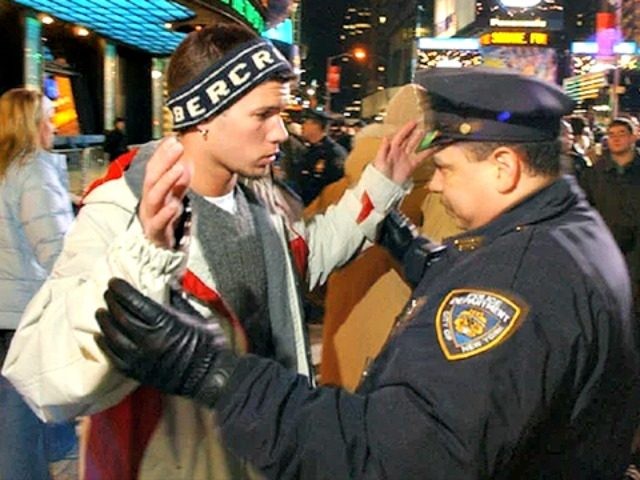Although Hillary Clinton condemned New York City’s stop-and-frisk policy during Monday’s debate (aided by Lester Holt, the debate moderator), the truth is that stop-and-frisk is perfectly constitutional under the Bill of Rights’ Fourth Amendment.
Mayor Rudy Giuliani implemented stop-and-frisk during his mayorship of the Big Apple—a tenure lauded as one of the most effective and successful big-city turnarounds in American history.
During the Hofstra debate, Holt asked Clinton about how she would improve race relations in America.
Clinton responded in part by pivoting to stop-and-frisk to vilify it, making part of her answer, “Stop-and-frisk was found to be unconstitutional and, in part, because it was ineffective.”
Donald Trump responded by pointing out that crime dropped under Giuliani and continued at that reduced level when his successor Michael Bloomberg continued the same policies initiated by America’s Mayor.
Crime in Gotham dropped by 85 percent from 1994 (when the policy began) through 2013, then Mayor Bill de Blasio ended the practice.
The Fourth Amendment of the Constitution provides:
The right of the people to be secure in their persons, houses, papers, and effects, against unreasonable searches and seizures, shall not be violated, and no Warrants shall issue, but upon probable cause, supported by Oath or affirmation, and particularly describing the place to be searched, and the persons or things to be seized.
In 1968, the nation’s highest court faced exactly the same issue of short warrantless police encounters on the street in Terry v. Ohio.
In Terry, the Supreme Court held:
When an officer is justified in believing that the individual whose suspicious behavior he is investigating at close range is armed and presently dangerous to the officer or to others, it would appear to be clearly unreasonable to deny the officer the power to take necessary measures to determine whether the person is in fact carrying a weapon and to neutralize the threat of physical harm.
For the sake of protecting the officer’s safety, and the safety of other people in the area, the Court concluded, the Fourth Amendment allows an officer “to conduct a carefully limited search of the outer clothing of such persons in an attempt to discover weapons which might be used against him.”
The lone dissenter in Terry, Justice William Douglas, wrote that the Fourth Amendment only allows a pat-down if the officer has probable cause to suspect a crime. All eight other justices—including archliberal Justice William Brennan—rejected that argument, in an opinion written by the most liberal chief justice the nation has ever had, Chief Justice Earl Warren.
Constitutional scholars know that 1968 was the most liberal year in the more than two centuries of the Supreme Court’s existence. Even the most liberal Supreme Court in American history rejected Clinton’s position by an 8-1 margin. But that’s exactly the position of Clinton and de Blasio.
It’s also the view of the only judge to rule against stop-and-frisk, Judge Shira Scheindlin. Well known as a liberal judicial activist, Scheindlin took unusual measures to ensure that she would get the case (claiming that it was linked to a previous case of hers that had been closed years ago), and then launched an angry broadside against police powers.
Scheindlin has been repeatedly reversed—unanimously—by the U.S. Court of Appeals for the Second Circuit on cases involving police authority, and even terrorism. She has demonstrated such extraordinary bias as a judicial activist on this issue that the federal appeals court took the extremely rare action of ordering her removed from the case.
But her removal was not before she issued a decision declaring that stop-and-frisk was unconstitutional the way it was being implemented. Note that even Scheindlin would not say it was unconstitutional. The Supreme Court’s Terry case would make her a laughingstock if she took that position (which is the position that Hillary Clinton took in the debate). But Scheindlin said it was being applied in an unconstitutional manner that focused too heavily on blacks and Hispanics.
Many legal experts expected the Second Circuit to smack down Scheindlin yet again. But then de Blasio was elected, and he withdrew the appeal from the Second Circuit before they could rule on the case and announced he was ending stop-and-frisk.
So the Supreme Court says Clinton is wrong, and even an ultra-left judicial activist would not go as far as Clinton’s false claim during her debate against Trump.
But with the death of Justice Antonin Scalia, unless Trump wins in November, Clinton will have the power to remake the Supreme Court in her own image, taking it far to the left of even 1968, and completely reinterpret the Fourth Amendment—along with the rest of the Constitution.
Ken Klukowski is senior legal editor for Breitbart News. Follow him on Twitter @kenklukowski.

COMMENTS
Please let us know if you're having issues with commenting.